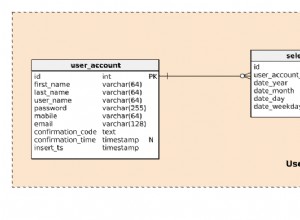Usa coalesce() e una sottoquery
select id, o1,
CASE WHEN o2!=o1 THEN o2 END o2,
CASE WHEN o3!=o2 THEN o3 END o3
FROM
( select id, coalesce(org1,org2,org3) o1,
coalesce(org2,org3) o2,
org3 o3 from tbl ) t
AGGIORNAMENTO
La risposta precedente non era sufficiente, come ha scoperto giustamente R2D2. Sfortunatamente non puoi eseguire CTE in mysql, quindi ho creato una vista (ho esteso l'esempio con un'altra colonna org4 ):
CREATE VIEW vert AS
select id i,1 n, org1 org FROM tbl where org1>'' UNION ALL
select id,2, org2 FROM tbl where org2>'' UNION ALL
select id,3, org3 FROM tbl where org3>'' UNION ALL
select id,4, org4 FROM tbl where org4>'';
Con questa visualizzazione è ora possibile effettuare le seguenti operazioni:
SELECT id,
(select org from vert where i=id order by n limit 1) org1,
(select org from vert where i=id order by n limit 1,1) org2,
(select org from vert where i=id order by n limit 2,1) org3,
(select org from vert where i=id order by n limit 3,1) org4
FROM tbl
Non è bello, ma fa il suo lavoro, vedi qui:SQLfiddle
input:
| id | org1 | org2 | org3 | org4 |
|----|--------|--------|---------|--------|
| 1 | HR | (null) | Staff | IT |
| 2 | (null) | IT | Dev | (null) |
| 3 | (null) | (null) | Finance | HR |
uscita:
| id | org1 | org2 | org3 | org4 |
|----|---------|-------|--------|--------|
| 1 | HR | Staff | IT | (null) |
| 2 | IT | Dev | (null) | (null) |
| 3 | Finance | HR | (null) | (null) |




